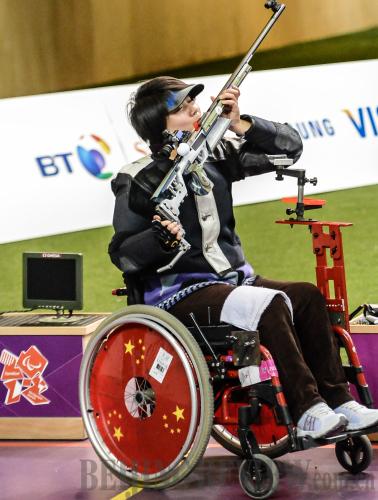|
 |
|
CELEBRATING: Zhang Cuiping kisses her rifle after winning the gold medal in the women's R8-50-meter air rifle in London on September 9. It was her second gold medal in London (WANG HAOFEI) |
Air rifle coach Wang Ping had plenty of reason to celebrate at the London 2012 Paralympic Games.
On the first day of the games, Wang was wildly thrilled after Zhang Cuiping won the first gold medal of the event in the women's R2-10-meter air rifle event with 500.9 points, breaking the previous world record in place for 10 years.
Dong Chao then won gold in the men's R1-10-meter air rifle, with a score of 699.5. It was the second medal for the Chinese shooting team.
Wang has served as a coach of the Chinese Paralympic shooting team for six years, and she always treats the athletes as her own children.
"I know the athletes are looking for the meaning of life. Compared to four years ago, they are now happier and more confident. This is more relieving for me. I think it is more important to help them restore happiness and dignity than win gold medals," said Wang.
The Chinese team consisted of 282 athletes, ranging in age from 15 to 50, and achieved China's highest standing in the games since the country first participated back in 1984. The team took away 95 gold medals, six more than in the Beijing Paralympic Games four years ago.
The young swimmer Yang Yang exemplified success by winning four gold medals, breaking two world records and one Paralympic record in London.
Yang comes from east China's Zhejiang Province. Born in Ningbo in 1997, he suffered from cerebral palsy due to a premature birth. His limbs couldn't spread, with his hands and feet turning inward. He had no strength in his wrists and was unable to stand. After seven operations, motion in his hands and feet remain limited and he has to travel by wheelchair.
"I could do nothing when I was young and I could only move freely in water, so people called me a 'fish swimming all day long,'" said Yang.
Yang's father, Jia Jingyu, believes that swimming, in addition to giving his son a tough mind, has made him calm and someone who never indulges in extreme emotions. Jia was his son's first swimming teacher.
"At that time, a medical expert from Beijing suggested I take my son to aquatic rehabilitation training, so I took him to a swimming pool. To my surprise, he walked several steps in the water. I was so thrilled that I immediately called his mother. She was cooking. But she hurried to the swimming pool. Witnessing the scene, she burst into tears," said Jia.
Since then, Yang's parents took him swimming during their spare time. As a fourth grade student three years later, a coach of the Zhejiang Provincial Swimming Team discovered him. Since then, he underwent professional training and was regularly sent to compete across the country.
"If I didn't choose swimming, today I probably wouldn't be able to move my arms," said Yang. "It was the first time for me to attend the Paralympic Games. Everybody was nice to me. I had no pressure. Actually, I imagined winning the gold medal, but I didn't expect my performance could be so good."
Yang's teammate, 20-year-old Paralympic gold medalist Xu Qing, is another fine example of the Paralympic spirit. Xu won the title at in the men's 100-meter freestyle S6 final, clocking in at 1:05.82.
Xu lost his arms in a car crash when he was 6 years old. A visit to an artificial limb factory changed the boy's life.
Xu's mother recalled that the factory boss—a Paralympic champion in table tennis—recommended Xu engage in sport in order to revitalize his disabled limbs.
When the boss asked what sport he liked, Xu responded, "I like to take baths."
When Xu first got close to a swimming pool, he drew back. "The 2-meter-deep swimming pool was frightening," he said.
Luckily, he met coach Ma Yunpeng.
"Xu was the only disabled child among my students. At that time, other children could get into the water with two arms carrying the floating board, but he couldn't," said Ma.
Xu mastered the breaststroke first.
"Ordinary people use two arms to blade the water and get forward. I could only depend on the strength of my waist. My speed was certainly slower than the others. And I often choked from the water," said Xu.
| 